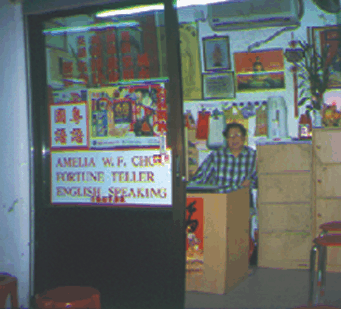Fortune tellingBy Kyle Hung and Cherry Lam Geomancy and other techniques of foretelling have a long history in Chinese society. Ms Amelia Chow, a member of the Royal Asiatic Society, has been in the geomancy business for 10 years. “Geomancy is not a superstition,” said Ms Chow. “It is deduced from history and mathematics.” Mr. Ken Lee, another fortune-teller, operates his business in a soothsayer’s stall in Wong Tai Sin Temple.
Geomancy has a long history, says Ms ChowMr. Lee differs from other fortune-tellers in that he uses computers to predict fortunes for his customers. “Although computers can give more precise calculations, it is still the fortune-teller who interprets the data,” said Mr. Lee. This is problematic. Said Dr. Tso Wung-wai, senior lecturer in the Biochemistry Department at The Chinese University of Hong Kong: “With their claimed statistical results, there would be over thousands of people in the world with the same fate. “No comprehensive survey has been conducted on the relationship between people’s destiny and their feature characteristics,” added Dr. Tso. “Fortune-tellers are unable to specify the cause-effect relationship between the two.” Ms Rika Kawasaki, a Japanese tourist, recently asked a fortune-teller in Wong Tai Sin Temple about her career prospects. “It was expensive,” said Ms Kawasaki. “He charged me $480 for a 10-minute litany of inaccurate statements about my past.” Another traditional way of fortune telling is through the so-called “rice-asking women”, a special type of fortune-teller in China. Mr. Simon Chan and his wife had the experience of asking for a fortune from a “rice-asking woman”. Once they arrived at the workplace of the “rice-asking woman”, she ejaculated a nearly correct list of his family members. Mr. Chan said, “She tried hard to convince me that I had an elder sister, but in fact I don’t.” He then learnt from his mother that before he was born, she had carried a premature female fetus which was lost due to miscarriage. Nevertheless, not every person considers “rice-asking women” so powerful. One woman recalled her experience of visiting a “rice-asking woman” who operates her business at home. “I wanted to know how my father-in-law was doing after his death,” said the 32-year-old woman. “She could not tell me anything for sure,” said Mrs. Cheng. “All she told me was that my father-in-law now lived near the sea and everything was fine.” A fairly new fortune telling practise in Hong Kong is Tarot cards. The origins and functions of the cards are unknown. It is said that if people treat the cards loyally and with respect, they can read what they want to know from the cards. Books about Tarot cards in both Chinese and English can be found in major bookstores. Although the origins of the cards are lost in history, some authorities claim the cards are from China, where using cards for fortune telling was practised as early as the 11th century. On the other hand, some authorities claim that the cards are from India, Spain, southern France, the Middle East or even Egypt. Concerning the cards’ fortune telling ability, some books claim that the images on the cards act as mirrors that reflect knowledge buried deep inside people’s unconscious minds. Missionary and general secretary of the Hong Kong Christian Short Term Mission Training Centre, Mr. Danny Ma Kwok-tung, said, “Using Tarot cards has a negative impact on the users.” A client of Mr. Ma heard threatening voices in her heart after foreseeing misfortune from Tarot cards a year ago. “I recommend those playing with Tarot cards to give them up as soon as possible for you will be controlled once you indulge in them,” said Mr. Ma. “Those who are thinking about starting should hesitate. “If you want to know about your hidden potential, read some psychological or EQ-related books instead,” said Mr. Ma. Rosita Yu, a Form 4 student, played with Tarot cards because she admired their popularity and fortune telling ability. “I think only those who indulge in it will get into trouble,” she said. Ms Wong Sin-ting, one of Rosita’s schoolmates, said she would never be involved in this kind of activity. “I think they are related to some devilish spirits and the cards’ predictions are always horrible,” said she. “The cards indicated that I couldn’t enroll in any university last year,” said another student, 19. “However, I am now studying in a university. [Disabled But Not Idle||Quality vs. Quantity] |
